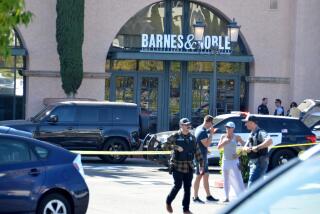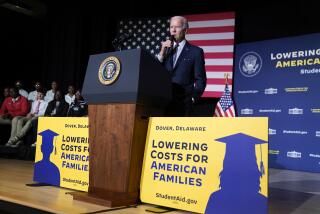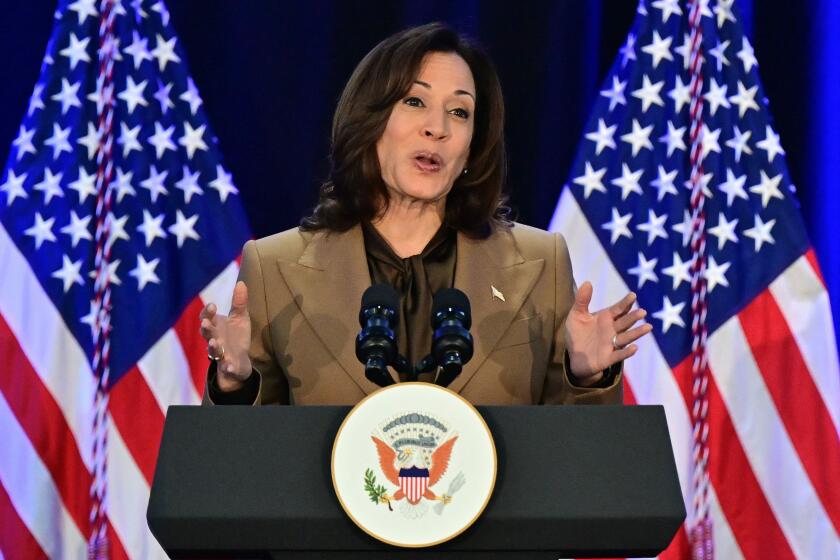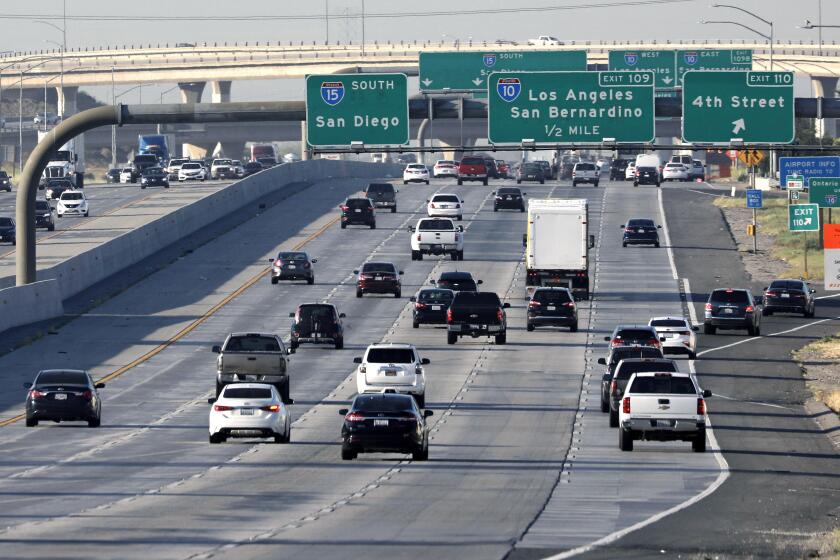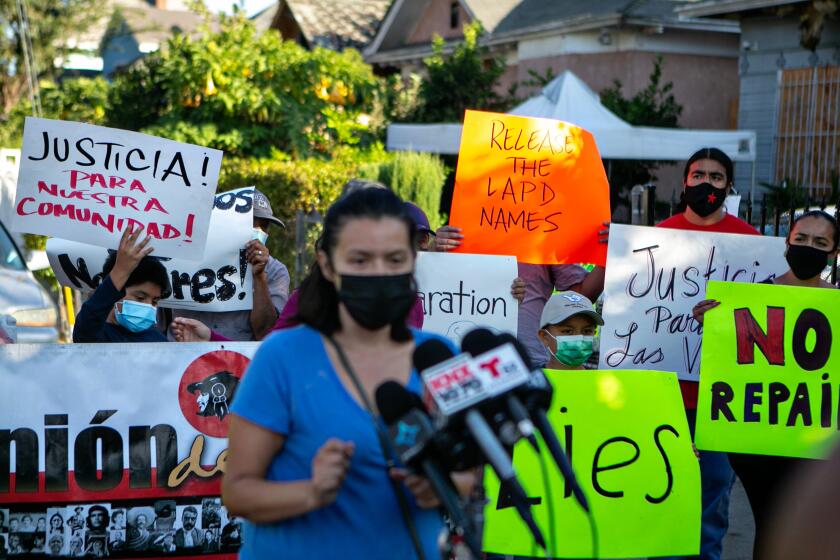Police Funding Failures May Haunt Hahn in Reelection Bid
Los Angeles Mayor James K. Hahn, who has repeatedly said public safety is his top priority, has failed for a second time in two years to significantly boost spending on the city’s beleaguered Police Department.
Despite a media blitz last week to pressure the City Council to put a sales tax hike on the March 8 ballot to pay for more officers, Hahn could not persuade skeptical council members to go back to voters so soon after a similar county measure failed less than two weeks ago.
The mayor did not rally support from leading business groups. Even the police union, which has been pushing for more officers for years, did not line up behind him.
Acknowledging defeat Saturday, the mayor expressed hope that the council would still agree to put a measure on the May ballot.
“I think that the people are behind me on this,” Hahn said. “They want to see more police officers. And I hope that the City Council will listen to their constituents.”
Hahn is not the first mayor to struggle to find ways to bolster the police force.
But his inability to deliver more police officers marks a setback for the mayor, who could have claimed credit for the plan as he campaigned for reelection in March. Last year, he also failed to convince council members that the city could hire 320 more officers.
The mayor’s stumble last week also underscored Hahn’s inability to bring elected officials and community leaders together to back one of his key initiatives.
“It’s very disappointing for the city,” said Kerman Maddox, a political strategist who is active in efforts to reduce violence in South Los Angeles.
“On an issue as fundamental as this one, you’d want to see religious leaders, homeowners associations and other groups running down to City Hall to support this,” said Maddox, who is not involved in the mayor’s race. “But I don’t think the mayor has developed the kind of goodwill in the city’s communities where people will say they will support this because the mayor is behind it.”
Instead, some council members suspected that Hahn was pushing the sales tax in part to bolster his crime-fighting credentials.
They grumbled that Hahn touted his plan to the media, rather than working with community leaders whom the mayor said would have to lead the campaign because he would be too busy running for reelection.
And council members, as well as some community leaders, were troubled that Hahn was pressuring the council to act before the Wednesday deadline to put a tax hike on the March ballot when he has had 3 1/2 years to develop a long-term strategy for expanding the police force.
“There’s no real plan,” said Bob Baker, president of the nearly 9,000-member Police Protective League and a strong proponent of expanding the Los Angeles Police Department. “There is just a lot of guesstimating.”
Baker said his union, which gave $500,000 to support the county sales tax measure, was very concerned about rushing into another tax campaign.
“I think it’s something that needs to be thought out a little more,” he said.
The league, which endorsed Hahn in his 2001 mayoral campaign, has not yet endorsed a candidate in the upcoming election.
Just three days after the county measure failed, Hahn announced that he wanted the City Council to put a sales tax hike before voters March 8 -- the day of the mayoral election.
Measure A, which would have boosted the sales tax in L.A. County from 8.25% to 8.75% to pay for additional police, sheriff’s deputies and other law enforcement programs, failed Nov. 2 to get the two-thirds majority needed to pass.
But more than 64% of voters in the city of Los Angeles favored the measure. And Hahn latched onto that solid support to announce that the city could not afford to squander the momentum.
In radio and newspaper interviews, the mayor touted a tax he said would allow the city to hire 1,200 police officers.
“We’d be able to reach my goal of making Los Angeles the safest big city in America,” the mayor said in one such interview, on KCRW-FM’s “Which Way L.A.” “I think that’s a goal that everybody shares.”
There is widespread support for increasing the size of the Police Department, whose ratio of officers per resident is much lower than in departments in major cities such as New York, Chicago and Philadelphia.
The mayor’s urgent media pitch, however, did not sit well with some of the city leaders who must decide whether to follow his lead.
“You don’t help yourself when you tell the press before bringing people in,” said Council President Alex Padilla, who played a key role in the campaign to pass the county measure. “There are people who might be on the fence but won’t support the mayor if they feel like they are being pushed around.”
Others wondered why the mayor would publicly call for a ballot measure without consulting with city and community leaders whom he would need to help raise money for a campaign and rally support to win the difficult two-thirds majority.
Hahn didn’t talk to council members. He didn’t check with the Police Protective League. And he didn’t consult with influential business groups, such as the Los Angeles Area Chamber of Commerce.
The chamber, which has historically backed new taxes to pay for public services, plans to convene a meeting next week with business and government leaders to discuss ways to raise money for public safety, something Hahn never did.
As troubling for some was a concern that mayoral politics influenced the timing of Hahn’s decision to push for more money for police officers.
Hahn has made his record on crime a centerpiece of his drive for a second term, frequently citing the dramatic drop in homicides and other violent crime in the two years since he appointed Chief William J. Bratton to head the department.
The mayor also cites his commitment to holding the line on police funding while state leaders siphoned tens of millions of dollars from Los Angeles to balance the state’s books.
And earlier this year, Hahn played a major role in helping to negotiate a pact with state leaders to prevent Sacramento from taking more local property taxes in the future.
“I was on track to do a thousand officers, easy. But Sacramento got in the way,” Hahn said. “I was going to refuse to let those guys run the city of Los Angeles.... That’s my plan. Get local revenues back.”
Hahn has managed to add relatively few new officers to the police force in his first term. He says he has added more than 450, but the LAPD’s most recent records suggest the number is closer to 370.
Bratton is pressing for 3,000 new officers, which would bring the size of the force to more than 12,000.
Hahn’s last three budgets have called for only incremental increases in the Police Department, and the mayor has never outlined a plan of his own to raise substantial new revenues to pay for more officers.
Last year, Hahn’s unsuccessful drive to win support for hiring 320 new officers depended heavily on the city’s reserve funds. Council members rejected the proposal amid concerns that the city would be unable to afford the new officers in future years.
Hahn did join the campaign for the county sales tax. But although he made a few public appearances, Bratton, Sheriff Lee Baca and others spearheaded the campaigning and fundraising.
Hahn contributed $10,000 from the campaign fund he used to fight San Fernando Valley secession two years ago, but that was less than the fund paid its attorneys this year.
And when Hahn came forward on his own with a sales tax plan without ever having presented a long-term strategy to build up and fund the Police Department, even some of the mayor’s allies in City Hall were unwilling to follow.
“I don’t think we’ve ever stopped to think it all out, for 2004, or 2005 or 2010,” said Councilman Tom LaBonge, who has endorsed Hahn’s reelection campaign. “We haven’t had a long-term plan.”
More to Read
Start your day right
Sign up for Essential California for news, features and recommendations from the L.A. Times and beyond in your inbox six days a week.
You may occasionally receive promotional content from the Los Angeles Times.
